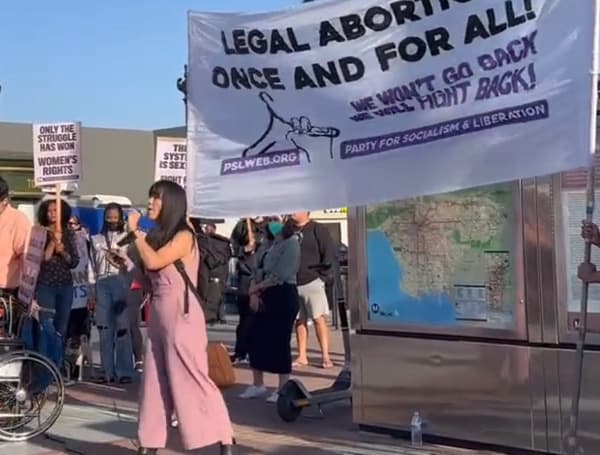A Leon County circuit judge is expected to rule Thursday on a request to block a new Florida law that bars abortions past 15 weeks of pregnancy, after a battle of expert witnesses played out in court Monday.
Judge John Cooper will hear closing arguments Thursday, the day before the law (HB 5) is scheduled to take effect. Cooper said he intends to rule from the bench about whether to issue a temporary injunction sought by plaintiffs.
Abortion clinics across the state and a physician who performs abortions filed the lawsuit June 1 against numerous defendants, including state attorneys, state Surgeon General Joseph Ladapo and Agency for Health Care Administration Secretary Simone Marstiller.
The lawsuit hinges on an argument that the law, signed by Gov. Ron DeSantis on April 14, violates a privacy clause in the state Constitution.
“As the Florida Supreme Court has repeatedly recognized, this broad right to privacy includes a woman’s right to decide to terminate a pregnancy,” an introductory part of the lawsuit said.
Monday’s hearing, however, centered on witness testimony that dealt mainly with abortion statistics and medical and scientific aspects of abortion — with arguments about privacy issues scarcely brought up.
Plaintiff Shelly Tien, an obstetrician and gynecologist who also practices internal fetal medicine, was called as an expert witness by attorneys representing her and the abortion clinics. Tien works with Planned Parenthood of South, East and North Florida in Jacksonville and testified that she has performed abortions on patients who have passed 15 weeks of pregnancy.
In the news: All Methed Up: Florida Fentanyl Trafficker Arrested Again For Trafficking Fentanyl And Meth
Tien was asked about who would be most impacted by the new law.
“Women and girls who need abortions after 15 weeks are those that tend to have the most challenging and compelling life circumstances,” Tien said.
Chief Deputy Attorney General John Guard cross-examined Tien and largely focused his questions on the number of abortions performed after the 15-week mark, a relatively small amount compared to abortions performed earlier in pregnancies.
“Ninety-six-point-four percent of women who receive an abortion in the state of Florida would not be impacted by HB 5, right?” Guard asked.
“Or, 1,600 (women) would be,” Cooper interjected.
Attorneys for the state called two witnesses affiliated with the Charlotte Lozier Institute, which they described as the “research arm” of the lobbying organization Susan B. Anthony Pro-Life America.
Maureen Condic, a professor of neurobiology at the University of Utah, testified that life begins essentially at the moment of conception and that fetuses are capable of feeling pain.
Condic was asked by an attorney for the plaintiffs if she would describe herself as pro-life.
“I would characterize myself as a scientist,” Condic said. “And the scientific evidence has led me to conclude that a human being exists from sperm-egg fusion and is capable of pain experience. Those two conclusions have led me to a position that protecting that life is an important interest.”
Cooper interrupted a line of questioning by an attorney for the state, in which Condic was being asked when life begins. Condic was in the middle of answering, saying that life begins upon “sperm-egg fusion.”
“I’m not here to litigate abortion, I’m here to litigate the right to privacy in Florida. I’m not here to litigate Roe v. Wade,” Cooper said.
The state’s other witness was Ingrid Skop, senior fellow and director of medical affairs for the Charlotte Lozier Institute. Skop also is a former obstetrician and gynecologist who said she practiced in Texas.
In the news: Liberals Demand MSNBC’s Chris Hayes Lose His Job For Questioning Democratic Leadership
Skop was asked about whether she thinks the new law will impede access to abortion.
“I think a limitation may cause some women to seek earlier abortions, which would be safer for them. The interpretation of the literature that discusses the reasons that women attain later abortions, which is primarily from abortion providers such as the Guttmacher Institute, tell me unequivocally that many women who seek these very late abortions do so under coercion, they do so under indecision,” Skop said.
The Guttmacher Institute is a non-profit organization that conducts research and supports abortion rights.
The hearing came amid a national debate about abortion after the U.S. Supreme Court on Friday struck down the landmark Roe v. Wade abortion-rights decision. The privacy right in the Florida Constitution, however, has long played a key role in abortion cases in the state.
A spokeswoman for the American Civil Liberties Union of Florida, which is helping represent the plaintiffs in the case, declined to speak with reporters following Monday’s hearing.
Andrew Shirvell, a lobbyist who is executive director of Florida Voice for the Unborn, Inc., called Monday a “show hearing.”
“I think it’s already a foregone conclusion of how the judge is going to rule and that the law will not, sadly, go into effect on July 1,” Shirvell told reporters after the state cross-examined Tien.
Visit Tampafp.com for Politics, Tampa Area Local News, Sports, and National Headlines. Support journalism by clicking here to our GiveSendGo or sign up for our free newsletter by clicking here.
Android Users, Click Here To Download The Free Press App And Never Miss A Story. Follow Us On Facebook Here Or Twitter Here.
Copyright 2022 The Free Press, LLC, tampafp.com. All rights reserved. This material may not be published, broadcast, rewritten, or redistributed.

